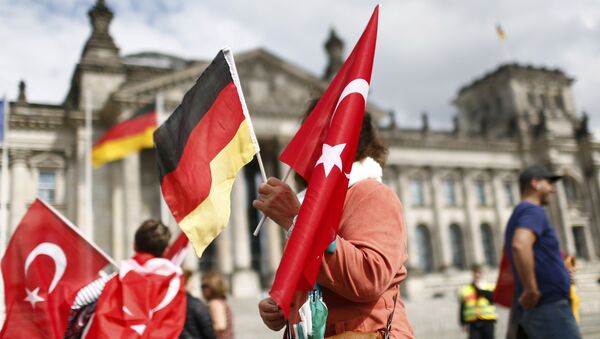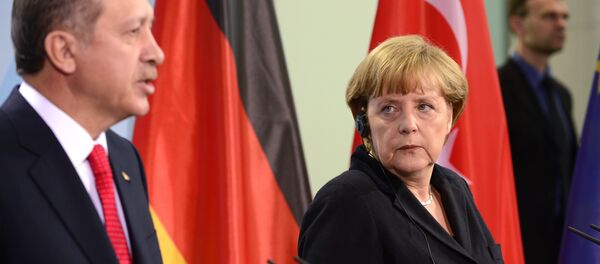Celik said that Berlin is inconsistent in its pursuance of democratic values. According to official data, the permission for a rally was revoked due to concerns about overcrowding.
In an interview with Sputnik Turkey, Turkish MP from the country's main opposition Republican People's Party Utku Cakirozer argued that the decision of German authorities to cancel the rally was wrong.
"Meetings of representatives of various political parties with compatriots living abroad is a common practice, it was not the first time when such event was to take place. We believe that the decision of the German authorities to cancel the event with the participation of Turkish Ministers was a mistake. While the country has openly carried out propaganda activities of terrorist organizations [Kurdistan Workers' Party], the Turkish minister is not given permission to hold the event. This is an unacceptable approach," Cakirozer told Sputnik.
In early February, Turkish President Recep Tayyip Erdogan approved the constitutional amendments that would increase presidential powers over the legislature and the judiciary. Under these amendments, the president would also be able to remain the head of the political party he represents, which is not allowed by the current legislation.
The amendments, however, have been criticized for potentially making the parliament dependent on the president and providing the head of the state with almost unlimited powers.
"To achieve sober, balanced and adequate results at the upcoming referendum, it is very important to ensure that every political force is able to freely and openly communicate with the electorate and express its positions. A significant number of our compatriots are living in Germany. This determines the need for such meetings, during which Turkey's political parties can tell the voters what the upcoming referendum is about, answer their questions and etc.," the politician said.
A similar opinion was expressed by deputy chairman of the parliamentary faction of Turkey's oppositional Nationalist Movement Party (MHP) Erkan Akcay.
"There are a significant number of Turkish citizens living in Germany. Each political party, not just the ruling party and the government officials, has there its own contacts, connections and supporters with whom it wants to meet. We believe that the position, according to which Turkish ministers were deprived of opportunity to organize meetings with Turkish citizens living abroad, is wrong und unacceptable. This situation is contrary to the European system of values, its principles," Akcay told Sputnik Turkey.
The tensions intensified on Friday after a German journalist of Turkish origin, Deniz Yucel, was arrested on Monday in Istanbul on charges of participation in a terrorist organization, misuse of data, as well as terrorism propaganda, which provoked a new wave of criticism toward Turkey.
Following the arrest, Turkish authorities accused Berlin of "giving shelter" to their enemies. In particular, Turkish President Recep Tayyip Erdogan claimed that an imprisoned Die Welt journalist in Turkey was a "German agent" and member of the militant Kurdish group PKK.




